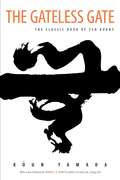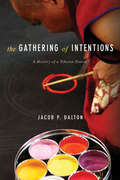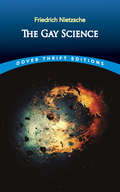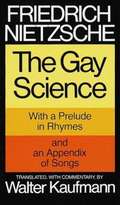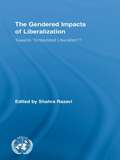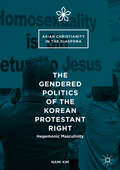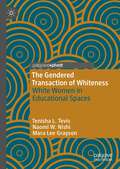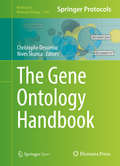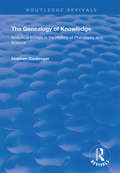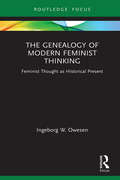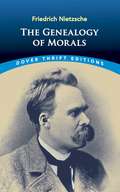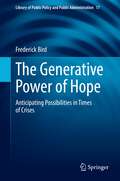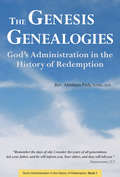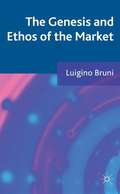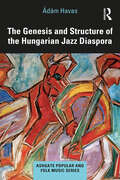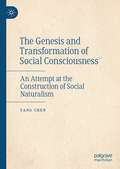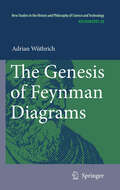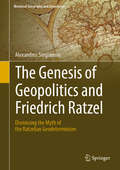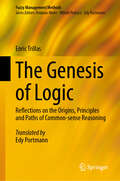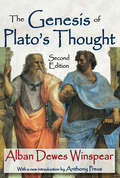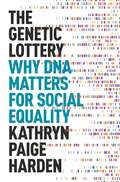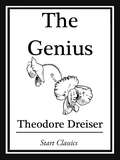- Table View
- List View
The Gateless Gate
by Ruben L. Habito Koun YamadaIn The Gateless Gate, one of modern Zen Buddhism's uniquely influential masters offers classic commentaries on the Mumonkan, one of Zen's greatest collections of teaching stories. This translation was compiled with the Western reader in mind, and includes Koan Yamada's clear and penetrating comments on each case. Yamada played a seminal role in bringing Zen Buddhism to the West from Japan, going on to be the head of the Sanbo Kyodan Zen Community. The Gateless Gate would be invaluable if only for the translation and commentary alone, yet it's loaded with extra material and is a fantastic resource to keep close by: An in-depth Introduction to the History of Zen Practice Lineage charts Japanese-to-Chinese and Chinese-to-Japanese conversion charts for personal names, place names, and names of writings Plus front- and back-matter from ancient and modern figures: Mumon, Shuan, Kubota Ji'un, Taizan Maezumi, Hugo Enomiya-Lasalle, and Yamada Roshi's son, Masamichi Yamada. A wonderful inspiration for the koan practitioner, and for those with a general interest in Zen Buddhism.
The Gathering of Intentions: A History of a Tibetan Tantra
by Jacob DaltonThe Gathering of Intentions reads a single Tibetan Buddhist ritual system through the movements of Tibetan history, revealing the social and material dimensions of an ostensibly timeless tradition. By subjecting tantric practice to historical analysis, the book offers new insight into the origins of Tibetan Buddhism, the formation of its canons, the emergence of new lineages and ceremonies, and modern efforts to revitalize the religion by returning to its mythic origins.The ritual system explored in this volume is based on the Gathering of Intentions Sutra, the fundamental "root tantra" of the Anuyoga class of teachings belonging to the Nyingma ("Ancient") school of Tibetan Buddhism. Proceeding chronologically from the ninth century to the present, each chapter features a Tibetan author negotiating a perceived gap between the original root text—the Gathering of Intentions—and the lived religious or political concerns of his day. These ongoing tensions underscore the significance of Tibet's elaborate esoteric ritual systems, which have persisted for centuries, evolving in response to historical conditions. Rather than overlook practice in favor of philosophical concerns, this volume prioritizes Tibetan Buddhism's ritual systems for a richer portrait of the tradition.
The Gay Science
by Friedrich Nietzsche Et. Al."God is dead. God remains dead. And we have killed him. . " This is the book in which Nietzsche put forth his boldest declaration. It is also his most personal, featuring some of the author's most important discussions of art, morality, knowledge, and, ultimately, truth.
The Gay Science: With A Prelude In Rhymes And An Appendix Of Songs (Dover Thrift Editions)
by Friedrich NietzscheAlthough dour in appearance and formidable in reputation, Friedrich Nietzsche was an ardent practitioner of the art of poetry—known in twelfth-century Provençal as "the gay science." This extensive collection of prose and verse offers a sophisticated treatment of the philosophical themes and views central to his thinking, as well as the ideas that proved most influential to later philosophers. Dating from the era when Nietzsche was at the peak of his intellectual powers, most of this book was written just before Thus Spoke Zarathustra, and the rest of it five years later, after Beyond Good and Evil. Zarathustra makes his first appearance in these pages, along with the author's well-known proclamation of the death of God. Readers will find this volume a wellspring for some of Nietzsche's most sustained and thought-provoking discussions of art and morality, knowledge and truth, the intellectual conscience, and the origin of logic, as well as the largest collection of Nietzsche's published poetry.
The Gay Science: With a Prelude in Rhymes and an Appendix of Songs
by Friedrich Nietzsche Walter KaufmannNietzsche called The Gay Science "the most personal of all my books." It was here that he first proclaimed the death of God -- to which a large part of the book is devoted -- and his doctrine of the eternal recurrence.<P><P> Walter Kaufmann's commentary, with its many quotations from previously untranslated letters, brings to life Nietzsche as a human being and illuminates his philosophy. The book contains some of Nietzsche's most sustained discussions of art and morality, knowledge and truth, the intellectual conscience and the origin of logic.<P> Most of the book was written just before Thus Spoke Zarathustra, the last part five years later, after Beyond Good and Evil. We encounter Zarathustra in these pages as well as many of Nietzsche's most interesting philosophical ideas and the largest collection of his own poetry that he himself ever published.<P> Walter Kaufmann's English versions of Nietzsche represent one of the major translation enterprises of our time. He is the first philosopher to have translated Nietzsche's major works, and never before has a single translator given us so much of Nietzsche.
The Gendered Impacts of Liberalization: Towards "Embedded Liberalism"? (Routledge/UNRISD Research in Gender and Development)
by Shahra RazaviIn the last two decades public policies have reflected a drive for accelerated global economic integration ("globalization"), associated with greater economic liberalization. The outcomes have been largely disappointing, even in the estimate of their designers. Rural livelihoods have become more insecure, and the expected growth has rarely materialized. Insecurity is also etched into the growth of informal economies across the world. Yet the economic policy agenda that has been so adverse to many people around the world has also provided new opportunities to some social groups, including some low-income women. In response to widespread discontent with the liberalization agenda, more attention is now being given to social policies and governance issues, viewed as necessary if globalization is to be "tamed" and "embedded". The contributors to this volume address key issues and questions such as whether states have the capacity to remedy the social distress unleashed by liberalization in the absence of any major revision of their macroeconomic policies and whether the proposed social policy reforms can redress gender-based inequalities in access to resources and power.
The Gendered Politics of the Korean Protestant Right
by Nami KimThis book provides a critical feminist analysis of the Korean Protestant Right's gendered politics. Specifically, the volume explores the Protestant Right's responses and reactions to the presumed weakening of hegemonic masculinity in Korea's post-hypermasculine developmentalism context. Nami Kim examines three phenomena: Father School (an evangelical men's manhood and fatherhood restoration movement), the anti-LGBT movement, and Islamophobia/anti-Muslim racism. Although these three phenomena may look unrelated, Kim asserts that they represent the Protestant Right's distinct yet interrelated ways of engaging the contested hegemonic masculinity in Korean society. The contestation over hegemonic masculinity is a common thread that runs through and connects these three phenomena. The ways in which the Protestant Right has engaged the contested hegemonic masculinity have been in relation to "others," such as women, sexual minorities, gender nonconforming people, and racial, ethnic, and religious minorities.
The Gendered Transaction of Whiteness: White Women in Educational Spaces
by Tenisha L. Tevis Naomi W. Nishi Mara Lee GraysonThis book considers the causes and effects of an education field that remains white and gendered and critically examines how the race-gendered power afforded to white women in educational spaces is transacted through instructional practices and interpersonal interactions. White women occupy a complex position in society within systems of white supremacy and patriarchy, participating as both oppressors and oppressed. Emphasizing the consequences of whiteness for educational professionals and students of all racial identities, the chapters in this book offer strategies for identifying and moving beyond the gendered transaction of whiteness, including what white women can do instead and how all educators can work toward transformative antiracist education.
The Gene Ontology Handbook
by Christophe Dessimoz Nives ŠkuncaThis book is open access under a CC BY 4. 0 license. This book provides a practical and self-contained overview of the Gene Ontology (GO), the leading project to organize biological knowledge on genes and their products across genomic resources. Written for biologists and bioinformaticians, it covers the state-of-the-art of how GO annotations are made, how they are evaluated, and what sort of analyses can and cannot be done with the GO. In the spirit of the Methods in Molecular Biology book series, there is an emphasis throughout the chapters on providing practical guidance and troubleshooting advice. Authoritative and accessible, The Gene Ontology Handbook serves non-experts as well as seasoned GO users as a thorough guide to this powerful knowledge system.
The Genealogy of Knowledge: Analytical Essays in the History of Philosophy and Science (Routledge Revivals)
by Stephen GaukrogerFirst published in 1997, this volume expands the analytical philosophical tradition in the face of parochial Anglo-American philosophical interests. The essays making up the section on ‘Antiquity’ share one concern: to show that there are largely unrecognised but radical differences between the way in which certain fundamental questions – concerning the nature of number, sense perception, and scepticism – were thought of in antiquity and the way in which they were thought of from the 17th century onwards. Part 2, on early modern thought, explores the theoretical characterisation of the role of experiment in early modern physical theory through Galileo’s embracing of experiments, along with Descartes’ automata and issues in a relatively neglected but especially intractable part of Descartes’ philosophy: how he conceives of what a successful inference consists in and what it is that makes it successful. The final section deals with the philosophical foundations of physical theory, the distinction between the human and the natural sciences, the philosophical-cum-scientific foundations of Marx’s idea of socialism, and Nietzche’s criticisms of the very notion of science, concluding that Nietzsche’s probing questions cannot be dismissed, as he has opened up some genuinely challenging issues which we ignore at our peril.
The Genealogy of Modern Feminist Thinking: Feminist Thought as Historical Present (Routledge Research in Gender and Society)
by Ingeborg W. OwesenWithin much contemporary feminist theory there is a tendency to forget or ignore its own historicity and consider itself as primarily oriented towards the present. This book explores the historical roots of some of feminism's central concepts and debates, examining the philosophical conditions for feminist thought and taking as its point of departure the dynamic relationship between feminist thought and the history of philosophy. With close attention to the genealogy of key concepts such as equality, sex/gender and difference, alongside discussions of contemporary gender equality policy and contextual understandings of central figures including Wollstonecraft, Beauvoir and Irigaray, The Genealogy of Modern Feminist Thinking provides an analysis of feminism from its origins in the early modern period to its contemporary, post-modern forms. Shedding light on feminism as a product of modernity and establishing it as part of the canon of European intellectual development, this book thus corrects the picture of feminism as a phenomenon that lacks historical continuity, revealing a history characterized by breaks, setbacks and forgetting, in which the forgetting itself forms part of a rich genealogy. As such, it will be of interest to philosophers, sociologists, political theorists and intellectual historians alike.
The Genealogy of Morals (Dover Thrift Editions)
by Friedrich NietzscheWritten in response to a book on the origins of morality by his erstwhile friend Paul Rée, the three essays comprising The Genealogy of Morals -- all three advancing the critique of Christian morality set forth in Beyond Good and Evil -- are among Nietzsche's most sustained and cohesive work.In the first essay -- starting from a linguistic analysis of words such as "good," "bad," and "evil" -- Nietzsche sets up a contrast between what he calls "master" morality and "slave" morality and shows how strength and action have often been replaced by passivity and nihilism. The next essay, looking into the origins of guilt and punishment, shows how the concept of justice was born -- and how internalization of this concept led to the development of what people called "the soul." In the third essay, Nietzsche dissects the meaning of ascetic ideals.It is not Nietzsche's intention to reject ascetic ideals, "slave" morality, or internalized values out of hand; his main concern is to show that culture and morality, rather than being eternal verities, are human-made. Whether or not you agree with all of his conclusions, his writing is of such clarity and brilliance that you will find reading The Genealogy of Morals nothing short of exhilarating.
The General Will
by David Lay Williams James FarrAlthough it originated in theological debates, the general will ultimately became one of the most celebrated and denigrated concepts emerging from early modern political thought. Jean-Jacques Rousseau made it the central element of his political theory, and it took on a life of its own during the French Revolution, before being subjected to generations of embrace or opprobrium. James Farr and David Lay Williams have collected for the first time a set of essays that track the evolving history of the general will from its origins to recent times. The General Will: The Evolution of a Concept discusses the general will's theological, political, formal, and substantive dimensions with a careful eye toward the concept's virtues and limitations as understood by its expositors and critics, among them Arnauld, Pascal, Malebranche, Leibniz, Locke, Spinoza, Montesquieu, Kant, Constant, Tocqueville, Adam Smith, and John Rawls.
The Generative Power of Hope: Anticipating Possibilities in Times of Crises (Library of Public Policy and Public Administration #17)
by Frederick BirdThis book analyses how and why we are living at a critical moment in the history of human life on earth and explores how we find grounds for the hopes that will enable us to address the challenges and crises of our time. The author analyses hope both practically and philosophically as a generative virtue to realistically discern the situations in which we find ourselves, and imaginatively to anticipate possibilities when the future is unknown and uncertain. The author argues that hope is a mean between anomy, disillusionment, and despair, on the one hand, and wishful thinking, dreaming, and fanaticizing, on the other hand. The book not only examines – and analyzes from a historical perspective - the contemporary crises such as climate change, environmental degradation and its effects such as the social costs of these developments, but also further analyzes the character and micro-dynamics of hope and how it makes a difference in how we manage the crises which inevitably emerge. Though contemporary crises are those we tend to focus on, the author also engages with what is involved in a due regard for history and the relevance of a sense of history for addressing the crises of our time. He shows us what we can learn from revisiting some thoughtful reflections by thinkers like Niebuhr, Jaspers, Camus, and Arendt. Finally, the author shows us what is involved practically in anticipating possibilities, by looking at hope as a social practice and noting how hopeful people make a difference.
The Genesis Genealogies: God's Administration in the History of Redemption
by Abraham ParkA basic part of understanding one's ancestors is knowing when they were born, how long they lived, and when they died. Here in The Genesis Genealogies lies that crucial core information about the forebears of Christianity.Rev. Abraham Park has meticulously analyzed the information in The Book of Genesis. <P><P>Taking the precise date references in Genesis and performing math calculations forward and backward in time, he builds a complete chronological timeline from Adam to the Exodus-allowing us to more deeply understand the layers of meanings that the text offers.
The Genesis and Ethos of the Market
by Luigino BruniA discussion of the anthropological roots of the market, tracing its development using the history of ideas and cultures as well as simple game theory. In his analysis of market ethics Bruni calls for a reconsideration of some of the central tenets of modern political economy, and the need for a new spirit of capitalism.
The Genesis and Structure of the Hungarian Jazz Diaspora (Ashgate Popular and Folk Music Series)
by Ádám HavasIn Hungary, jazz was at the forefront of heated debates sparked by the racialised tensions between national music traditions and newly emerging forms of popular culture that challenged the prevailing status quo within the cultural hierarchies of different historical eras. Drawing on an extensive, four-year field research project, including ethnographic observations and 29 in-depth interviews, this book is the first to explore the hidden diasporic narrative(s) of Hungarian jazz through the system of historically formed distinctions linked to the social practices of assimilated Jews and Romani musicians. The chapters illustrate how different concepts of authenticity and conflicting definitions of jazz as the "sound of Western modernity" have resulted in a unique hierarchical setting. The book's account of the fundamental opposition between US-centric mainstream jazz (bebop) and Bartók-inspired free jazz camps not only reveals the extent to which traditionalism and modernism were linked to class- and race-based cultural distinctions, but offers critical insights about the social logic of Hungary’s geocultural positioning in the ‘twilight zone’ between East and West to use the words of Maria Todorova. Following a historical overview that incorporates comparisons with other Central European jazz cultures, the book offers a rigorous analysis of how the transition from playing ‘caféhouse music’ to bebop became a significant element in the status claims of Hungary’s ‘significant others’, i.e. Romani musicians. By combining the innovative application of Pierre Bourdieu’s cultural sociology with popular music studies and postcolonial scholarship, this work offers a forceful demonstration of the manifold connections of this particular jazz scene to global networks of cultural production, which also continue to shape it.
The Genesis and Transformation of Social Consciousness: An Attempt at the Construction of Social Naturalism
by Yang ChenThis book focuses on the formation of human social consciousness and develops a naturalist approach to social normativity. Beginning from Marx's uncompleted concept of social consciousness, the book retrospects the studies about collective intentionality in the area of philosophy of mind and social ontology. Specifically, a reinterpretation of social consciousness with respect to collective intentionality can offer us a new, naturalistic approach to the social formation and normativity. According to the naturalistic approach, we can discern the inner structure of social consciousness as a systematic pattern of Intentionality. Social consciousness involves three levels of development: subjective, objective and absolute. With this new pattern of social consciousness, the “naturalism” of the young Karl Marx can be revived. And by grasping the most essential ability of human Intentionality as the source of social formation, it also makes an interdisciplinary study of social philosophyand philosophy of mind possible.
The Genesis of Feynman Diagrams
by Adrian WüthrichIn a detailed reconstruction of the genesis of Feynman diagrams the author reveals that their development was constantly driven by the attempt to resolve fundamental problems concerning the uninterpretable infinities that arose in quantum as well as classical theories of electrodynamic phenomena. Accordingly, as a comparison with the graphical representations that were in use before Feynman diagrams shows, the resulting theory of quantum electrodynamics, featuring Feynman diagrams, differed significantly from earlier versions of the theory in the way in which the relevant phenomena were conceptualized and modelled. The author traces the development of Feynman diagrams from Feynman's "struggle with the Dirac equation" in unpublished manuscripts to the two of Freeman Dyson's publications which put Feynman diagrams into a field theoretic context. The author brings to the fore that Feynman and Dyson not only created a powerful computational device but, above all, a new conceptual framework in which the uninterpretable infinities that had arisen in the old form of the theory could be precisely identified and subsequently removed in a justifiable manner.
The Genesis of Geopolitics and Friedrich Ratzel: Dismissing The Myth Of The Ratzelian Geodeterminism (Historical Geography and Geosciences)
by Alexandros StogiannosThis book discusses the influence of Friedrich Ratzel's ideas in more contemporary geopolitical analytical systems and the geodeterminism commonly attributed to him. The author thoroughly analyzes the structural components of Ratzel's thought. The research is inspired by the numerous contradictory approaches in the secondary literature, presenting Ratzel as both humanist and racist, geo-determinist and multidimensional analyst, organicist and social scientist, precursor of Geopolitics and opponent to the same idea. In this work, more particular issues are approached: the establishment of a scientific Political Geography; the methodological approach of his multidisciplinary work; the redefinition of his geopolitical period; his notion of state and the evaluation of sociological and cultural parameters as factors of state power; the biogeographical content of the notion of Lebensraum; his attitude towards the racist theories as well as towards the Darwinian theories; his overall worldview and the confrontation with cosmopolitism; his contribution to an interdisciplinary, positivist and scientific approach in analyzing social and international affairs; his thoughts on the architecture of Europe. The book will be useful for researchers and students in many scientific fields, such as International Relations, Geopolitics, Geography and History of Geography.
The Genesis of Logic: Reflections on the Origins, Principles and Paths of Common-sense Reasoning (Fuzzy Management Methods)
by Enric TrillasThe Genesis of Logic addresses the principles of common-sense reasoning, which are employed in everyday decision-making processes and extend beyond deductive reasoning alone. Linked to language, logic inherits its flexibility. These are a few laws, the 'formal skeleton of reasoning,' based on the relationship of linguistic inference that, while needing to be represented in each context, allow for the consideration of non-comparable, orthogonal statements. By facilitating deduction and abduction, speculation emerges as a fundamental intellectual operation. As a whole, this work offers a new genetic-evolutionary perspective to reconsider Logic, a panoramic outlook that examines laws outside the skeleton as local laws, necessary for the validity of specialized reasoning. It moves away from the rigid reticular structure of sets of statements and views induction as the search for speculations, non-monotonic reasoning as speculative, and conjecture, only proven in finite Boolean algebras,that reasoning involves following paths of inference in a zigzag pattern, alternating between deduction and abduction.
The Genesis of Plato's Thought: Second Edition
by Alban WinspearIt is often said that to understand Plato we must understand his times. Many readers who might accept without question this saying of historical criticism may still wonder why we should think it necessary to begin our enquiry as far back as Homer and beyond. In the case of Plato there is an even greater need to pursue the argument back to the very beginnings of the historical period in which he lived and worked.It is quite impossible to understand the genesis of Plato's ideas without understanding the profound change that Greek society underwent in the post-Homeric period that preceded him. This change in social structure created a mercantile, progressive Greek society, one which laid the foundations for all the subsequent history of Europe and the West. The Genesis of Plato's Thought is particularly highly regarded because it departs vigorously from the traditional abstract, static view of Plato's thought.Winspear's volume on Plato's thought traces, in a realistic fashion, the deep-reaching social and economic roots of Plato's concept of the state and society. Winspear believes that nowhere can the social roots of philosophy be more sharply seen and more firmly apprehended than when one is dealing with the origins of Western philosophy among the Greeks. His book contains the body of information which any reader should have if they wish to approach Plato as a historical figure. To make the book useful to a wide circle of readers, brief biographical identifications for the various important figures of Greek life are introduced in the text.
The Genetic Lottery: Why DNA Matters for Social Equality
by Kathryn Paige HardenA provocative and timely case for how the science of genetics can help create a more just and equal societyIn recent years, scientists like Kathryn Paige Harden have shown that DNA makes us different, in our personalities and in our health—and in ways that matter for educational and economic success in our current society.In The Genetic Lottery, Harden introduces readers to the latest genetic science, dismantling dangerous ideas about racial superiority and challenging us to grapple with what equality really means in a world where people are born different. Weaving together personal stories with scientific evidence, Harden shows why our refusal to recognize the power of DNA perpetuates the myth of meritocracy, and argues that we must acknowledge the role of genetic luck if we are ever to create a fair society.Reclaiming genetic science from the legacy of eugenics, this groundbreaking book offers a bold new vision of society where everyone thrives, regardless of how one fares in the genetic lottery.
The Genetic Origination of Truth-Toward-Being: Edith Stein’s Reconfiguration of Husserl’s Phenomenology
by Jim RuddyUsing both Father Kevin Wall’s eidetic matrix of “the relational unity of being” and Edith Stein’s remarkable synoptic view of intentionality in both Aquinas and Husserl, this book uncovers purely logical ground for a subalternate eidetic science called "convergent phenomenology," itself located at the inmost depths of Husserlian phenomenology. Convergent phenomenology emerges as a distinctively new discipline dealing with relation-like objectivity as opposed to the thing-like objectivity of traditional phenomenology. This has grand implications for the way we as humans conceive of God and being. The book thus benefits theologians, logicians, and phenomenologists by revealing the constitutive interrelationality of transcendental logic in an utterly new light as already flowering forth into formal ontology itself. What emerges is a rich conception of divinity and humanity.
The Genius
by Theodore DreiserTheodore Dreiser (1871 to 1945) pioneered the "Naturalist" school of writers, using detailed realism to convey stories rather than embellishing through Romantacism or Surrealism. He is known for seminal works such as "Sister Carrie," "The Titan," and "An American Tragedy." Dreiser campaigned throughout his life against social injustice, and was a committed socialist.
